How Much Does a Shower Remodel Cost in 2024?
Thinking of remodeling your shower? Here is what you need to know to help you set up a realistic budget.
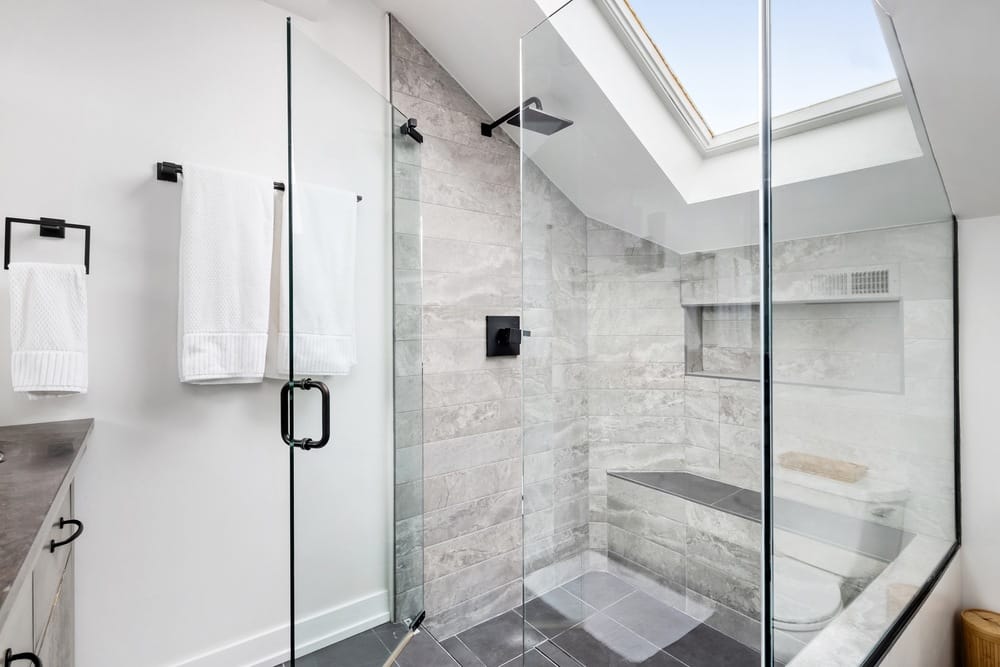
A great shower at the beginning of the day can give you a great start to your day, just as an evening shower can help you unwind after a long day. Updating your existing shower or adding one to your bathroom can not only improve your showering experience but also add value to your home. However, with the typical cost for shower remodel ranging from $2,000 to $15,000 or more, navigating the associated expenses can be daunting.
In this post, we look at the different ways to remodel your shower so you can estimate the project costs and budget accordingly. We explore how shower size, materials, labor, and unexpected repairs influence the final price tag. We also provide insights into cost-saving strategies like DIY options and alternative materials, empowering you to find the perfect balance between your budget and your dream shower design.
Average cost range: $2,000 - $15,000
As with any other project in your home, the average cost of shower remodels largely depends on the scope of the work and finishing materials. In the US, typical shower remodels range from $2,000 to $15,000. If you plan on changing the bathroom's layout to accommodate the shower or want to add premium materials, that number can quickly skyrocket.
Shower remodel cost: detailed breakdown
Let's break it down to get a clearer picture of what you can expect to pay based on the type of shower you want to add or remodel in your home. Here is a detailed breakdown of the critical factors that impact your shower remodel's final price tag.
Remodel cost by type of shower
Shower-tub combo: This classic choice offers both bathing and showering functionality. Remodeling a shower-tub combo is generally the most affordable option, ranging from $2,000 to $5,000. Costs can vary depending on the chosen tub material (acrylic or cast iron) and showerhead fixtures.
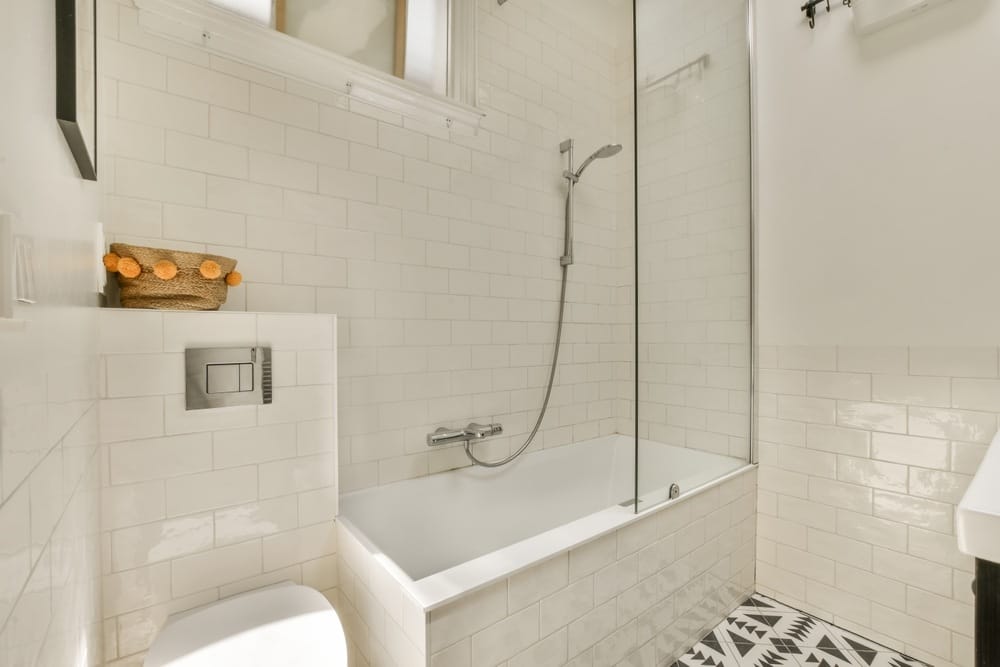
Standard shower stall: This space-saving option is perfect for smaller bathrooms. Standard shower stalls with a prefabricated acrylic or fiberglass base and a shower curtain can cost as low as $1,500. Upgrading to tile walls or a glass door will increase the price to the $3,000 - $5,000 range.
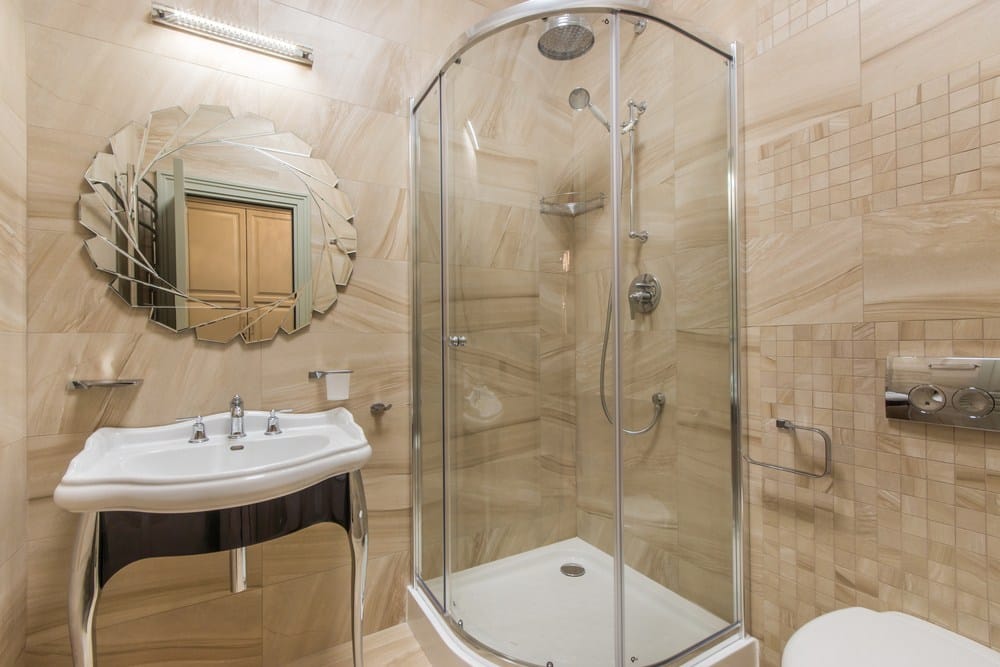
Walk-in shower: The epitome of modern luxury, walk-in showers offer a spacious and accessible showering experience. The average cost of a walk-in shower remodel depends on materials and design. A basic tiled walk-in shower with a shower curtain costs around $3,500 - $5,000. However, factors like custom tilework, multiple showerheads, a bench seat, and frameless glass doors can quickly push the price up to $10,000 or even $15,000.
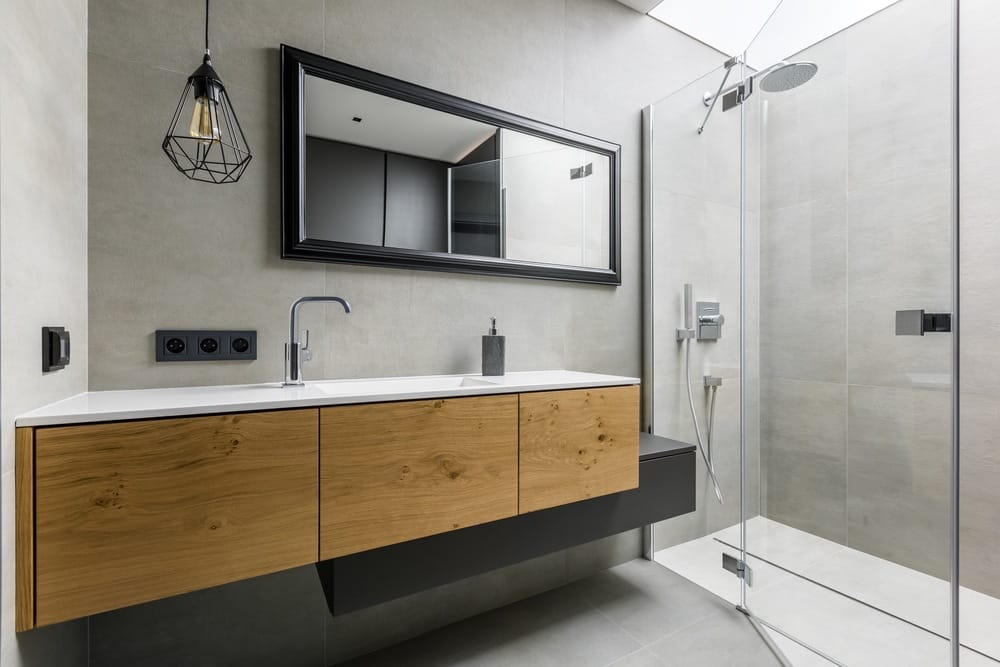
Custom shower: If you're seeking a unique showering experience, a custom shower allows for complete design freedom. This option involves building the shower from scratch, including the pan, walls, and fixtures. Custom showers are the most expensive option, typically starting at $8,000 and potentially exceeding $20,000, depending on the complexity and materials used.
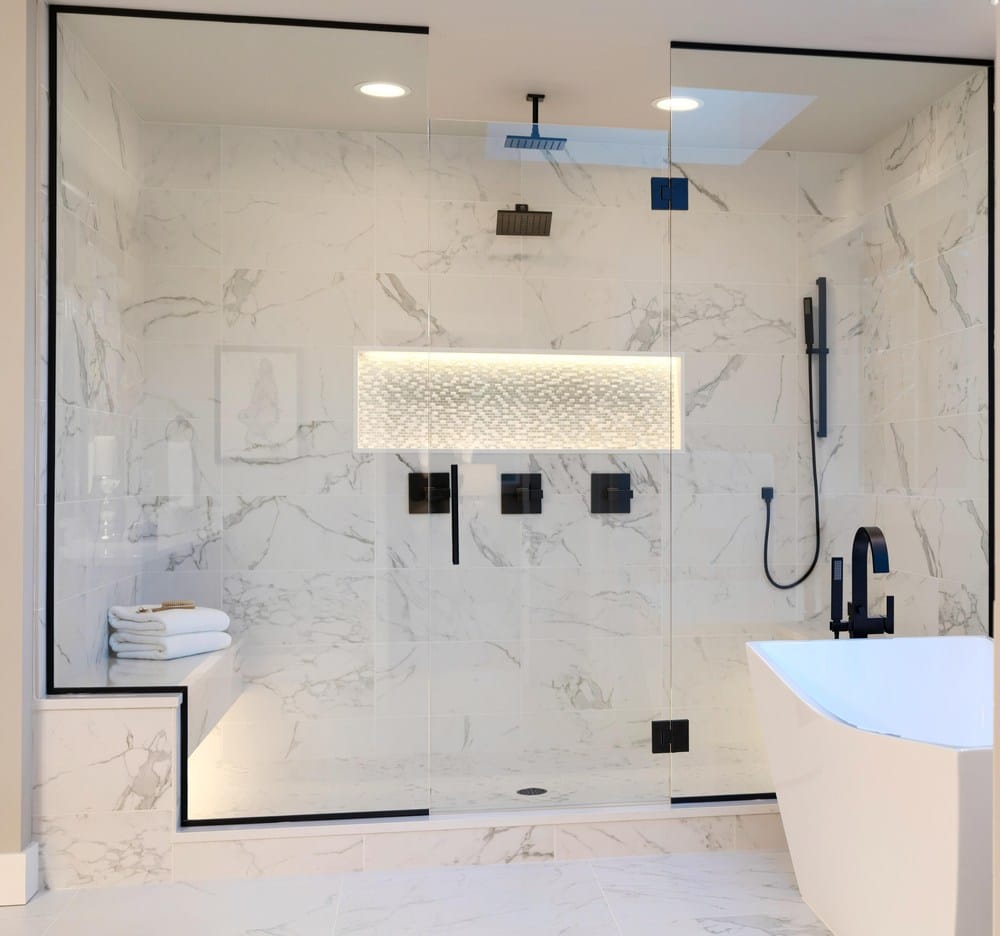
Additional costs that can impact your project include:
- Shower base material: Prefabricated acrylic or fiberglass bases are budget-friendly. Custom tile or stone bases offer a more high-end look but come at a premium.
- Shower doors: Shower curtains are the most affordable option, while framed glass doors balance style and cost. Frameless glass doors provide a sleek, modern look but are the most expensive.
- Showerhead options: A single showerhead is standard, but features like multiple showerheads, body sprays, or rain showers can significantly increase costs.
Remodel cost by shower size
Shower size plays a crucial role in determining your remodel budget. Here's a breakdown of typical shower dimensions and their estimated costs:
- Small shower stalls (3' x 3' or less): These compact showers are ideal for tiny bathrooms. A basic stall with a prefabricated acrylic base, shower curtain, and standard fixtures can cost as low as $1,500 to $2,000. Upgrading to tile walls or a glass door can increase the price to $2,500 - $3,500.
- Standard shower stalls (3' x 4' to 3' x 5'): This is the most common shower size, offering a comfortable showering experience without sacrificing significant space. A standard shower stall with a prefabricated base, showerhead, and curtain typically falls between $2,000 and $4,000. Adding tile walls and a glass door can push the cost to $4,000 - $6,000.
- Large shower stalls (4' x 4' and above): These showers offer more space and a more luxurious experience. A large shower stall with a prefabricated base, tile surround, showerhead, and standard fixtures can range from $4,000 to $6,000. Adding high-end features like multiple showerheads, body sprays, a bench seat, and a frameless glass door can significantly increase the cost to $8,000 - $12,000 or even more.
- Walk-in showers: Walk-in showers come in various sizes, with the minimum recommended dimensions being 3' x 3' for a single user and 3' x 5' for a more luxurious experience. A basic walk-in shower with a tiled floor, standard showerhead, and curtain might cost around $3,500 - $5,000. However, as with large shower stalls, walk-in showers can quickly become more expensive with custom tilework, multiple showerheads, a bench seat, and frameless glass doors, potentially reaching $10,000 or even $15,000 and beyond.
Additional factors to consider:
- Shower shape: Square or rectangular showers are generally more cost-effective than custom shapes that require additional materials and labor.
- Shower base material: Prefabricated shower bases are budget-friendly, while custom tile or stone bases for larger or oddly shaped showers will add to the cost.
- Shower wall options: While standard tiles are popular for all showers, intricate tile patterns or high-end stone materials can increase the price significantly.
Shower materials cost breakdown
The materials used in your shower remodel can significantly impact the remodel cost. Here's a breakdown of common shower materials and their price ranges:
Shower base
- Prefabricated acrylic or fiberglass: The most budget-friendly option, typically ranging from $200 to $500. Available in various sizes and textures, it offers a good balance of affordability and functionality.
- Custom tile base: Provides a more high-end look and allows for complete design control. Costs can vary depending on the tile material and size, typically starting at around $500 and potentially exceeding $2,000 for large or complex designs.
- Stone shower base: This option offers a luxurious feel but comes with a hefty price tag. Natural stone shower bases in granite or marble, depending on the type and size, can cost $1,000 at the lower end and $5,000 or more at the higher end.
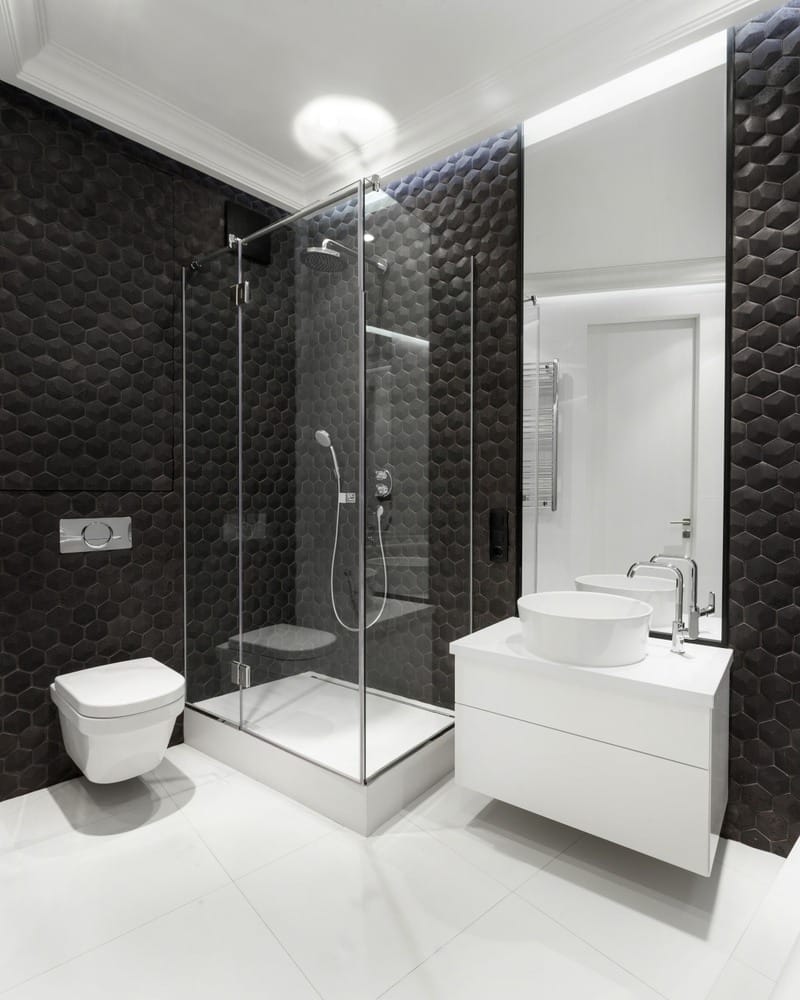
Shower walls
- Ceramic tiles are a popular shower wall option. They come in various colors, styles, and price points. Ceramic tiles can cost from $2 to $10 per square foot, with intricate patterns or specialty tiles costing more.
- Porcelain tiles are more durable than ceramic tiles, but they can also be more expensive. Porcelain tile typically costs between $5 and $20 per square foot.
- Natural stone tile is the ultimate luxury and the most expensive option. Natural stone like granite or marble can range anywhere between $20 to $100 per square foot or even more.
- Shower surround kits: Prefabricated acrylic or fiberglass wall panels offer a budget-friendly alternative to tile. They come in various colors and patterns and typically cost between $200 and $500 for a standard shower size.
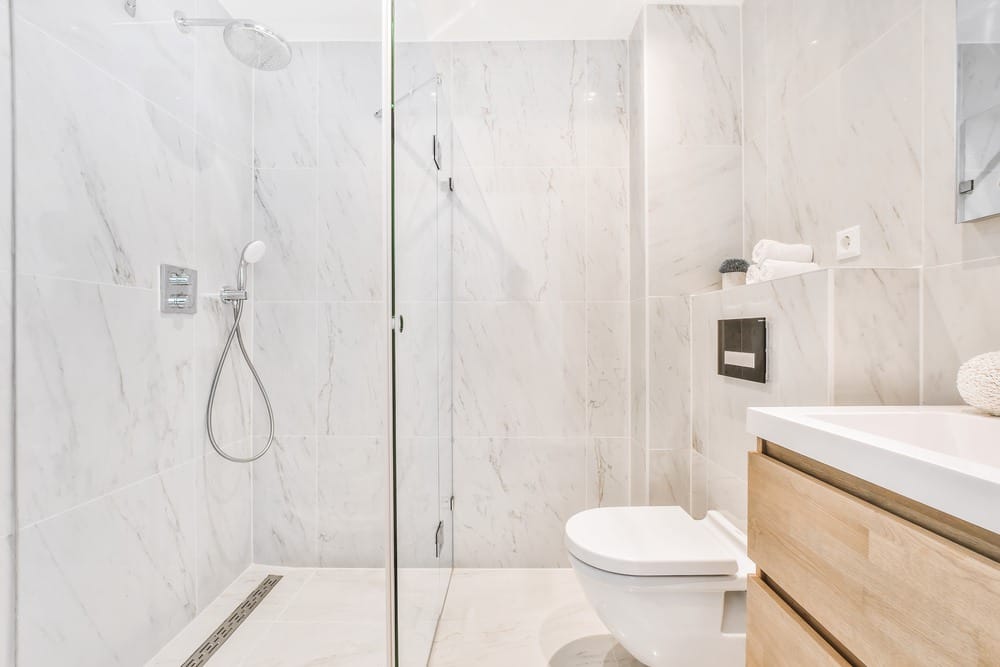
Shower doors
- Shower curtains are the most affordable option, with basic curtains costing as low as $20. However, they may not offer the same style or keep the water out as doors do.
- Framed glass doors offer a good balance of style and functionality. Depending on the size and frame material, they typically range from $500 to $1,500.
- Frameless glass doors provide a sleek, modern look but come at a premium. Depending on the size and thickness of the glass, they can cost anywhere from $1,000 to $3,000 or even more.
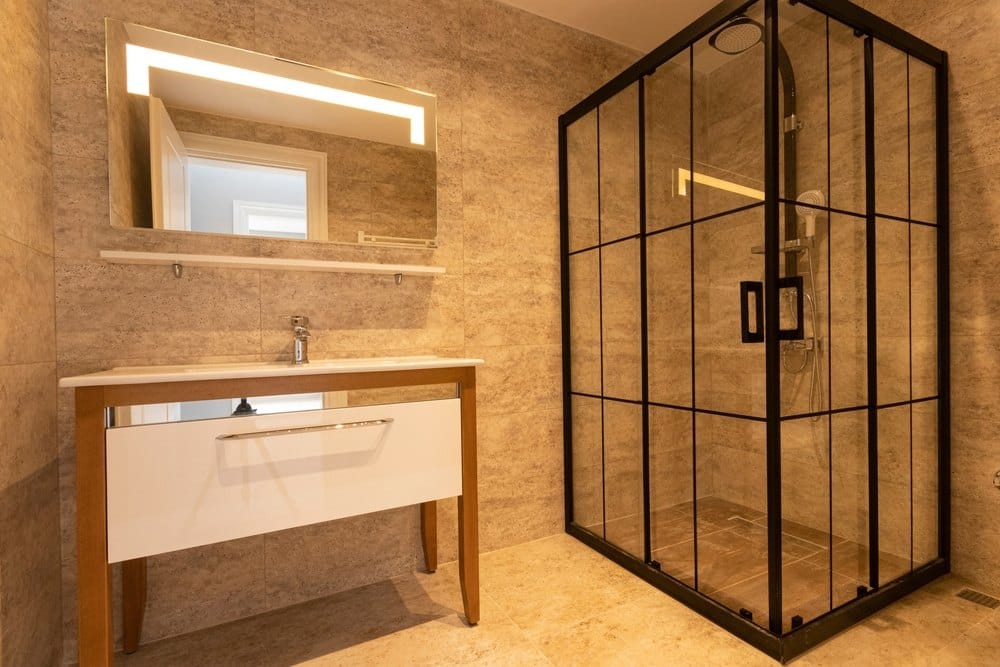
Additional considerations:
- Shower fixtures: Most prefabricated shower kits include a basic showerhead. However, higher-end fixtures like rain showers, body sprays, or handheld units can significantly increase costs.
- Shower niche: A built-in shelf or niche for storing toiletries adds functionality but requires additional tile work or materials.
- Shower bench: An excellent option for creating a spa-like experience or for those with mobility limitations. Shower benches can be constructed from tile, stone, or prefabricated acrylic, with costs varying depending on the material and design.
Bathroom condition
Your bathroom's condition will play a vital role in the cost of your remodel. While things might look fine on the surface, there could be potential pitfalls lurking beneath the surface.
One of the most common issues in a bathroom is mold and mildew. These unwelcome guests can indicate hidden moisture problems behind the walls or flooring. Remediation can be costly, involving removing affected materials, treating the source of moisture, and potentially replacing drywall or subflooring.
Plumbing issues are another costly expense you might encounter as you begin your project. Leaking pipes or outdated plumbing systems will often necessitate replacement during a remodel. The extent and cost of repairs will depend on the severity of the issue and the accessibility of the plumbing.
The same goes for electrical. If your bathroom's electrical wiring is knob-and-tube or hasn't been updated in decades, it may not support modern fixtures or appliances. Upgrading the electrical system can be a significant expense. Outdated electrical might not meet current safety codes, which can become problematic and halt your project.
Labor and permit costs
Remember to factor in labor costs and permit fees. While the allure of fancy tiles may be strong, skilled professionals are essential for a safe and successful remodel. Labor costs vary depending on where you live and the project's complexity but typically fall between $50 and $100 per hour for experienced shower installers.
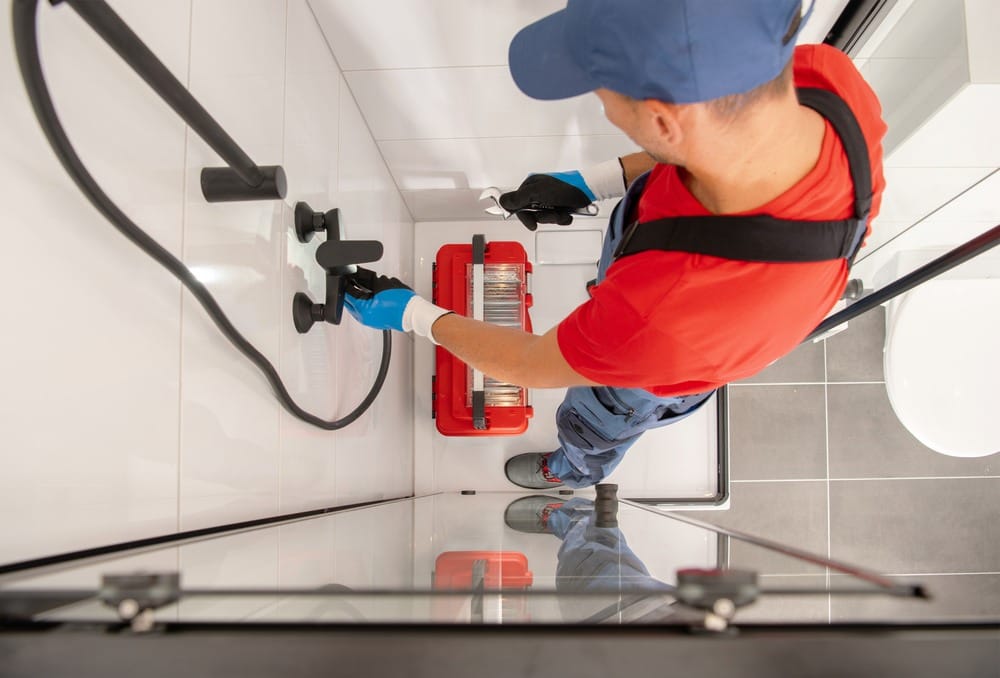
Permits also add to the overall cost, usually ranging from $200 to $500, depending on local requirements and the scope of the remodel. Budgeting for these additional expenses upfront will ensure you have a clear picture of the total project cost and avoid any nasty surprises down the line.
Scope of your remodel project
The extent of your shower remodel project is a key factor in the final cost. A simple shower refresh, which can be a cost-effective way to give your shower a new look, may involve cosmetic upgrades like replacing shower tile, fixtures, or doors. Labor costs are minimal, usually limited to demolition and installation of the new elements. Depending on your locality, permit requirements for minor cosmetic changes may be waived.
A complete gut renovation that involves a complete overhaul of the shower space will be a more expensive project. This could include demolishing the existing shower pan, walls, and fixtures, rerouting plumbing, and installing new features. Labor costs are significantly higher due to the increased complexity of the work. Permits are almost always required for gut renovations to ensure adherence to building codes.
Remodeling cost by shower type
Not all shower remodel projects are created equal. A basic tiled shower with a curtain and standard showerhead can cost between $3,500 and $5,000. Upgrading to features like a glass door, a built-in shower bench, or multiple showerheads can push the cost to $6,000 - $10,000. A custom shower with high-end tiles, a rain showerhead, body sprays and a frameless glass door can easily reach $10,000 or even $15,000 and beyond.
| Shower Type | Description | Cost Range |
|---|---|---|
| Basic | Tile surround, shower curtain, standard showerhead | $3,500 - $5,000 |
| Mid-Range | Glass door, built-in shower bench, multiple showerheads | $6,000 - $10,000 |
| Luxury | Custom tilework, frameless glass doors, rain showers, body sprays | $10,000 and beyond |
Cost to remodel bathroom with tile shower
Tile showers offer a beautiful and customizable option. The average cost to remodel a bathroom with a tile shower depends on several factors, including the shower size. Oversized showers require more tiles and labor, increasing the price.
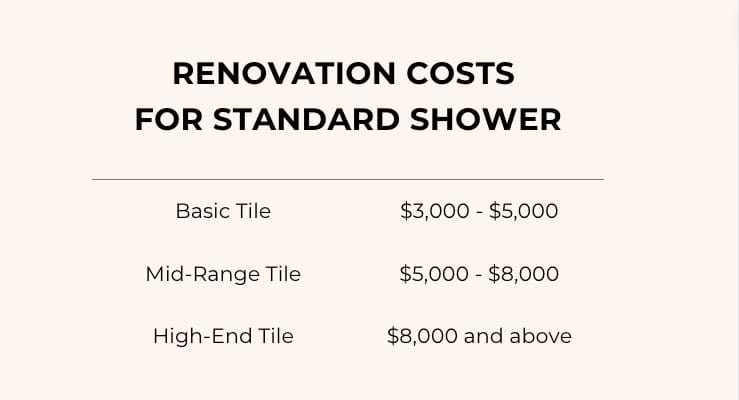
Basic ceramic tile is also more affordable than high-end stone or intricate mosaic patterns. If you're looking for a budget-friendly option, consider adding a prefabricated shower base.
Tub-and-shower combo remodel cost
This classic option offers both bathing and showering functionality. The remodel cost varies depending on the tub materials and shower features. Acrylic tubs are more affordable than cast iron or whirlpool tubs. Adding features like a glass door or multiple showerheads will increase the cost.

Remodel cost for a prefabricated shower kit
Prefabricated shower kits offer a budget-friendly and quick installation option. Costs vary depending on size, features, and material (acrylic or fiberglass). Most prefabricated kits need to be installed by professionals. However, that cost might still be lower than a complete shower remodel.
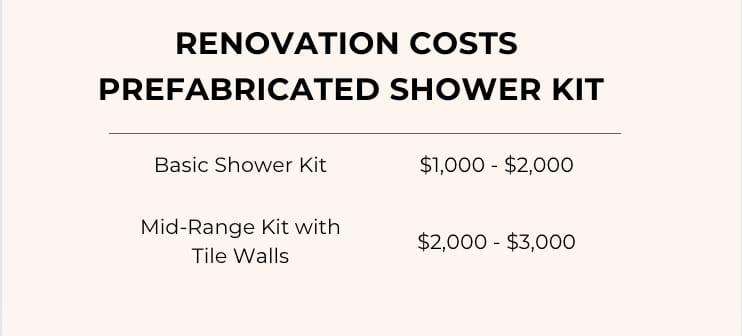
Cost of converting a tub to a shower
Replacing a bathtub with a shower can free up space and create a more modern look. The cost depends on the chosen shower type (standard stall, walk-in), materials, and plumbing modifications needed.

Other shower remodel costs
While the type of shower is a major cost factor, there are other expenses to consider for a complete picture of your shower remodel budget. Here's a breakdown of some additional costs you might encounter:
Water damage repair costs
Unexpected mold lurking behind the walls or hidden leaks can be a budget nightmare. The cost of water damage repair varies depending on the severity of the damage. Professional mold removal can range from $1,000 to $5,000, depending on the affected area and the extent of the remediation required. Fixing plumbing leaks can cost anywhere from $200 to $1,000, depending on the location and complexity of the leak.
Bath fan changes
Proper ventilation is crucial in a bathroom to prevent moisture buildup and mold growth. Upgrading your existing bath fan or installing a new one will cost between $100 and $500.
Removing an old shower or tub
Demolition of the existing shower or bathtub might be the first step in most remodels. Labor costs for demolition typically range from $500 to $1,000, depending on the size and complexity of the removal process.
Costs associated with shower doors
If you forgo a shower curtain and opt for a door instead, you will pay more for your bathroom project. Framed glass doors offer a balance of style and functionality, with costs ranging from $500 to $1,500 depending on the size and frame material. Frameless glass doors can give you that wow factor but are also the most expensive option. You're looking at anywhere from $1,000 to $3,000 or even more depending on the size and thickness of the glass.
Remodel costs for tiling
Basic ceramic tile is budget-friendly, while high-end porcelain or natural stone tiles can be significantly more expensive. Materials typically cost between $2 and $100 per square foot. Tiling a shower requires skilled labor, and installation costs typically fall$2 to $100 per square foot between $30 and $50 per square foot.
Bathroom plumbing remodel costs
Extensive plumbing changes or updates can significantly increase the overall remodel cost. Moving the shower controls or rerouting pipes can be expensive, ranging from $500 to $2,000, depending on the complexity of the work. While basic showerheads are included in most prefabricated shower kits, adding features like rain showers or body sprays can increase costs.
Other costs
You might also have to pay disposal fees. Hauling away the old shower, bathtub, and debris can cost $100 to $200 or more if you have to rent a truck to transport the debris.
Cost comparison between hiring a pro and DIY
Before you decide, evaluate your DIY skills and comfort level with plumbing and electrical work before embarking on a DIY shower remodel. Consulting with a qualified contractor can help you understand the scope of the project, potential risks, and whether DIY is a viable option for your specific situation.
Hiring a pro
- Pros:
- Ensures a safe and up-to-code remodel
- Saves time and avoids potential mistakes that can be costly to fix.
- Professional contractors have experience and expertise handling plumbing, electrical work, and tiling.
- Cons: Higher overall cost due to labor charges.
DIY option
- Pros: Lower upfront cost if you have the necessary skills and tools.
- Greater control over the project and the satisfaction of completing it yourself.
- Cons:
- Requires significant time commitment and DIY skills, especially for plumbing and electrical work.
- Mistakes can be expensive to fix and may lead to safety hazards.
- Permits might be more difficult to obtain without a licensed contractor.
It isn't easy to give a definitive answer as project complexity varies. However, hiring a professional will likely cost 20-50% more than a DIY project. You also have to factor in the potential costs of:
- Materials wasted due to mistakes
- Hiring professionals to fix DIY mistakes
- Unexpected repairs due to improper installation
- Cost of permits if you can't obtain them yourself
- Tool rental
When considering the cost comparison, weigh the value of your time, skillset, and risk tolerance against the potential cost savings of a DIY project.
Tips for saving and cost-cutting
Even with professional help, shower remodels can stretch your budget. To make the most of your investment without sacrificing quality, clearly define your budget upfront and stick to it. A well-defined project scope will help you avoid change orders that can inflate costs.
Identify your needs and wants by prioritizing essential features and functionality over luxury upgrades. Explore cost-effective alternatives like prefabricated shower bases or standard tile instead of high-end stone and compare prices at different retailers and supply stores. Consider using salvaged or refurbished fixtures or vanity tops for a unique touch and potential cost savings.
As we already mentioned, doing the work yourself can be a significant budget saver. However, you should only tackle such a project if you have the skills and know-how. Otherwise, you'll pay more for a professional to fix any mistakes. Get quotes from multiple qualified contractors to compare pricing and find the best value.
Conclusion
Shower remodels can be a great way to add value to your home and create a luxurious and functional space for relaxation. Understanding the factors that can influence the project's cost will help you make informed decisions about materials and labor, and set a realistic budget.
Not sure what shower type and style works best for you? Try the Planner 5D bathroom design tool to create a virtual bathroom design that you'll love.
FAQ
How much does it cost to remodel a shower?
The cost to remodel a shower depends on the complexity of the project and materials. Replacing a shower can range from $2,000 to more than $20,000.
What's the cheapest way to redo a shower?
Refreshing your existing shower is the most budget-friendly option. To save on a bathroom shower remodel cost, consider re-glazing tile, replacing fixtures, or installing a prefabricated shower kit.
Why is shower replacement expensive?
Shower remodeling costs stem from labor, waterproofing materials, chosen features, and potential surprises like hidden water damage during demolition.
How much does a bathtub-to-shower conversion cost?
Converting a tub to a shower is generally cheaper than a full replacement, ranging from $2,000 to $5,000. A simple conversion might cost $2,000-$3,000, while a custom tile shower conversion can reach $5,000.
